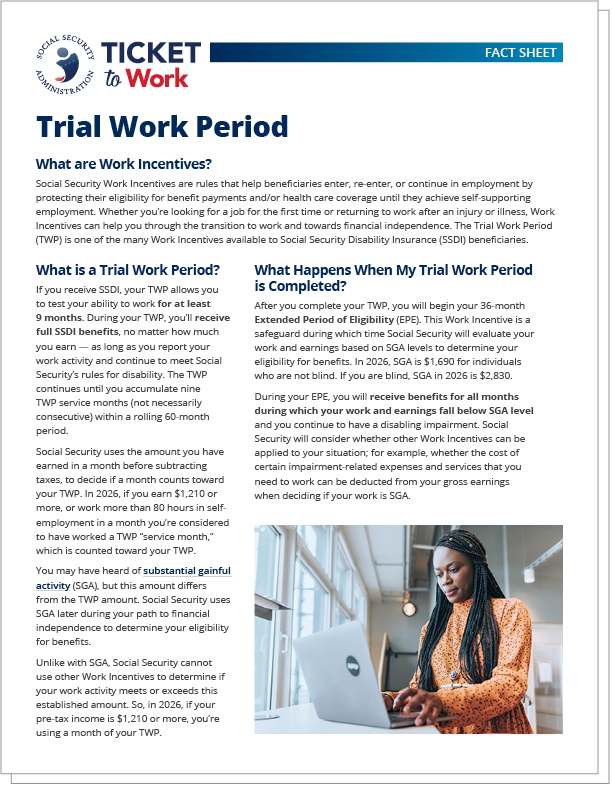Social Security makes every effort to ensure that any information published is accurate and up to date, but some information on this webpage may be historical.
Trial Work Period (TWP)
 What are Work Incentives?
What are Work Incentives?
Social Security Work Incentives are rules that help beneficiaries enter, re-enter, or continue in employment by protecting their eligibility for benefit payments and/or health care coverage until they achieve self-supporting employment. Whether you’re looking for a job for the first time or returning to work after an injury or illness, Work Incentives can help you through the transition to work and towards financial independence. The Trial Work Period (TWP) is one of the many Work Incentives available to Social Security Disability Insurance (SSDI) beneficiaries.
What is a Trial Work Period?
If you receive SSDI, your TWP allows you to test your ability to work for at least 9 months. During your TWP, you’ll receive full SSDI benefits, no matter how much you earn — as long as you report your work activity and continue to meet Social Security’s rules for disability. The TWP continues until you accumulate nine TWP service months (not necessarily consecutive) within a rolling 60-month period.
Social Security uses the amount you have earned in a month before subtracting taxes, to decide if a month counts toward your TWP. In 2026, if you earn $1,210 or more, or work more than 80 hours in self employment in a month you’re considered to have worked a TWP “service month,” which is counted toward your TWP.
You may have heard of substantial gainful activity (SGA), but this amount differs from the TWP amount. Social Security uses SGA later during your path to financial independence to determine your eligibility for benefits.
Unlike with SGA, Social Security cannot use other Work Incentives to determine if your work activity meets or exceeds this established amount. So, in 2026, if your pre-tax income is $1,210 or more, you’re using a month of your TWP.
What Happens When My Trial Work Period is Completed?
After you complete your TWP, you will begin your 36-month Extended Period of Eligibility (EPE). This Work Incentive is a safeguard during which time Social Security will evaluate your work and earnings based on SGA levels to determine your eligibility for benefits. In 2026, SGA is $1,690 for individuals who are not blind. If you are blind, SGA in 2026 is $2,830.
During your EPE, you will receive benefits for all months during which your work and earnings fall below SGA level and you continue to have a disabling impairment. Social Security will consider whether other Work Incentives can be applied to your situation; for example, whether the cost of certain impairment-related expenses and services that you need to work can be deducted from your gross earnings when deciding if your work is SGA.
The first time you work above SGA in the EPE, Social Security will decide that you no longer meet the requirements for disability due to work. At that point, your disability will be considered ceased. Social Security will pay benefits for the month your disability ceased and the following two months. This is the grace period. If your earnings fall below SGA and you are still in the 36-month re-entitlement period, Social Security can restart your benefits without a new application.
The Ticket to Work Program
For more employment resources and job support, Social Security’s Ticket to Work (Ticket) Program can help. The Ticket Program supports career development for people ages 18 through 64 who receive Social Security disability benefits (SSDI/SSI) and want to work. This free and voluntary program offers services and supports designed to help people with disabilities reach their career goals.
If you have a job offer or are working, many Ticket Program service providers have a certified Benefits Counselor on staff who can help you understand Social Security work incentives and how earnings from work (including self-employment) will affect your health care and other benefits. You can also learn more in Social Security’s Red Book at ssa.gov/redbook
Expedited Reinstatement
Expedited Reinstatement (EXR), acts as a safety net for people who successfully return to work and are no longer entitled to benefits
If you need to stop working because of a medical impairment that’s the same as or related to your original disabling impairment within 5 years of when your benefits stopped, EXR may make it possible for you to have your benefits start again without needing to submit a new application.
Learn More
To learn more about the Ticket Program, call the Ticket to Work Help Line at 1-866-968-7842 or 1-866-833-2967 (TTY) Monday through Friday, 8 a.m. to 8 p.m. ET. Ask a representative to send you a list of service providers or find providers on your own with the Ticket Program Find Help tool.
Learn More
To learn more about the Ticket Program, call the Ticket to Work Help Line at 1-866-968-7842 or 1-866-833-2967 (TTY) Monday through Friday, 8 a.m. to 8 p.m. ET. Ask a representative to send you a list of service providers or find providers on your own with the Ticket Program Find Help tool.